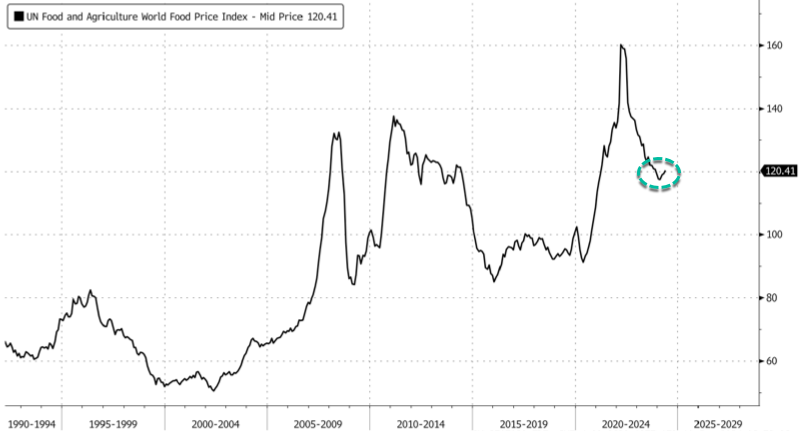(Zero Hedge)—Sunny Verghese, CEO of Olam Agri, a Singapore-based agricultural trading firm, spoke at the Redburn Atlantic and Rothschild consumer conference last week, warned the audience that the world is heading towards a period of “food wars” as geopolitical wildfires spread across the globe.
“We have fought many wars over oil. We will fight bigger wars over food and water,” Verghese said, quoted by the Financial Times, adding that food protectionism has forced some governments to boost domestic food supplies, exacerbating food inflation.
He pointed out that a surge in non-tariff trade barriers in 2022 in response to the war in Ukraine—1,266 from 154 countries by his count—had sparked “an exaggerated demand-supply imbalance.”
Food prices have soared in recent years, whether due to adverse weather conditions (sparked by El Nino) or the war in Ukraine. These prices are likely to remain elevated for years to come.
Verghese said wealthier countries have been building surpluses of strategic commodities due to global uncertainty, which has helped push food prices higher.
“India, China, everybody has got buffer stocks,” he said, adding, “That is only exacerbating the global problem.”
The latest data from the Food and Agriculture Organization of the United Nations shows that global food prices are beginning to rise once again and remain well above pre-Covid levels.
What’s clear is that the most impoverished countries are extremely vulnerable to surging food prices and shortages, and these areas are at the highest risk of social unrest.
However, wealthier economies aren’t immune, as we’ve seen evidence with US consumers pulling back on food spending while complaining about the failure of Bidenomics.
FT provided two recent examples of food protectionism that is likely to continue in the years ahead, exacerbating food security risks for the world’s most vulnerable:
In 2022, Indonesia banned palm oil exports to protect the local market while last year India imposed export restrictions on certain types of rice in an effort to curb rising domestic prices ahead of parliamentary elections, after a volatile monsoon disrupted production and spurred fears of a supply shortage.
The risks are skewed toward more food export curbs as the world splinters into a multipolar state full of conflict and chaos. Protectionism might be the worst thing for food security and yet another reason why prices will linger at elevated levels for the years to come.
This is yet more evidence that Americans need to ditch Walmart and the food-industrial complex and support local farmers so they can beef up local supply chains to minimize risks abroad.
It’s becoming increasingly clear that fiat currencies across the globe, including the U.S. Dollar, are under attack. Paper money is losing its value, translating into insane inflation and less value in our life’s savings.
Genesis Gold Group believes physical precious metals are an amazing option for those seeking to move their wealth or retirement to higher ground. Whether Central Bank Digital Currencies replace current fiat currencies or not, precious metals are poised to retain or even increase in value. This is why central banks and mega-asset managers like BlackRock are moving much of their holdings to precious metals.
As a Christian company, Genesis Gold Group has maintained a perfect 5 out of 5 rating with the Better Business Bureau. Their faith-driven values allow them to help Americans protect their life’s savings without the gimmicks used by most precious metals companies. Reach out to them today to see how they can streamline the rollover or transfer of your current and previous retirement accounts.




Obviously.